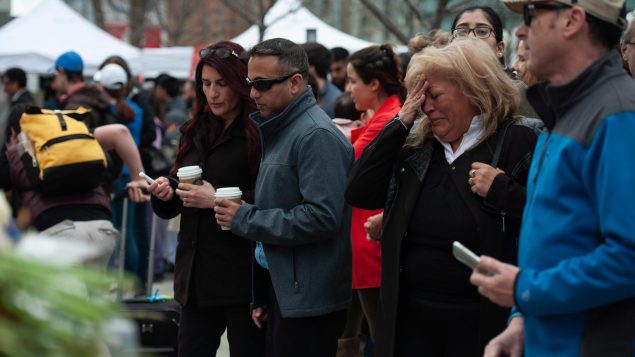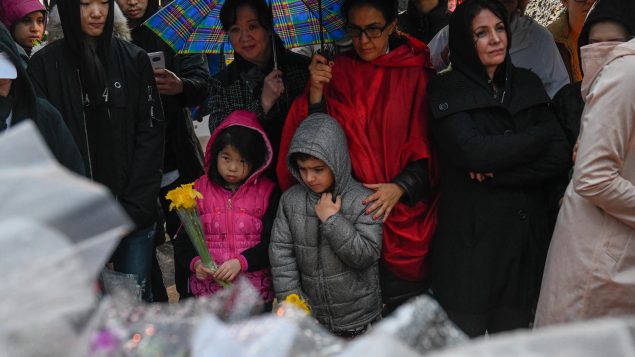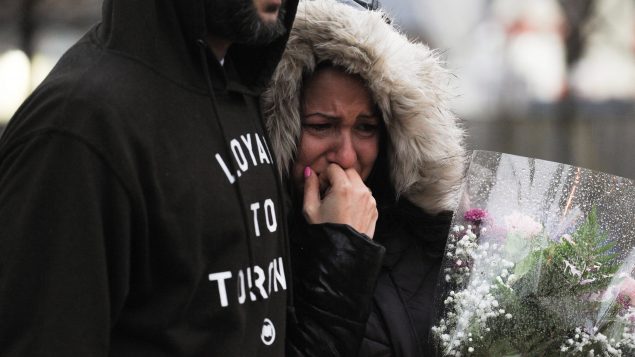Those who saw the van run down people on the sidewalks of Toronto or the aftermath experienced varying degrees of shock and other emotions that may persist for a long time. It can be difficult, but there are things that can help people cope.

A woman wipes her tears at a memorial on Yonge Street the day after a man drove a rented van down sidewalks striking pedestrians. (Galit Rodan/The Canadian Press)
Fear and anxiety do not surprise psychologist
“It’s not at all surprising that what we’ve seen in Toronto and…in Canada more generally, is fear…and anxiety, a realization that we all kind of knew before but that is very palpable now, that it could happen anywhere, anytime, including where we are,” says Steven Joordens, a professor of psychology at the University of Toronto Scarborough.
He says that the way our mind insulates itself from stress and anxiety is often through our social connections. “What we often see in the wake of a tragedy like this, after people get over the original shock, is a desire to do something, a desire to connect, a sense of community coming together, being strong. And often, this can happen even at an international level.” He gives the examples of Queen Elizabeth sending condolences and the U.S. portion of Niagara Falls lit up in a special way to show support and solidarity.

Prof. Steven Joordens says the random nature of an attack make people feel powerless and drives them to do something positive.
‘People feel very helpless and powerless’
The random nature of the attack can make people feel powerless. “We don’t like to feel powerless. We like everything to have a narrative that kind of makes sense to us…And we like to think there are things that we can do that can reduce the likelihood of events happening or, if they happen, reduce the negative impact,” says Joordens.
“So, people often in this situation, will first feel very helpless and powerless, but then will feel this drive to do something, to be some sort of positive force. So, that can be the laying of flowers, the writing of messages, the donation of money to families. We often feel compelled to do that to bring some positivity to what is otherwise a horrific situation.”
PTSD is an evolutionary feature
People who directly saw or dealt with the tragedy may suffer post-traumatic stress disorder. Joordens explains that with PTSD, human evolution is at play. Our ancestors may have heard sounds, or noticed smells and then suddenly been attacked by a predator. Assuming they survived, the next time they observed the same sounds and smells they may have become very wary and that would have helped them avoid an attack. So, this mechanism is a feature that helped humans survive.
In the current context though, it means a sight, sound or smell that people associate with a past dangerous event may trigger a huge reaction even if there is no imminent danger. Joordens says there are new ways to treat PTSD for those who are affected this way and seek help.

Lighting candles, placing flowers, writing messages can all help people cope. (Galit Rodan/The Canadian Press)
Reconnect socially, advises psychologist
For the rest of us, he says one of the best things we can do is to reconnect with our important social network: “Spend some time talking about this event and about our feelings and, that connection with…other people who understand what we’re feeling and who are feeling the same way. That’s a very important thing that the brain uses to insulate it from the stress and anxiety.
“So to some extent, we can all be each other’s therapists at this point in time.”

Connecting with people who are close to you is an important way to help deal with stress and anxiety, says psychologist. (Galit Rodan/The Canadian Press)







For reasons beyond our control, and for an undetermined period of time, our comment section is now closed. However, our social networks remain open to your contributions.